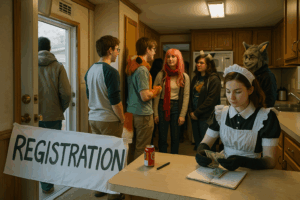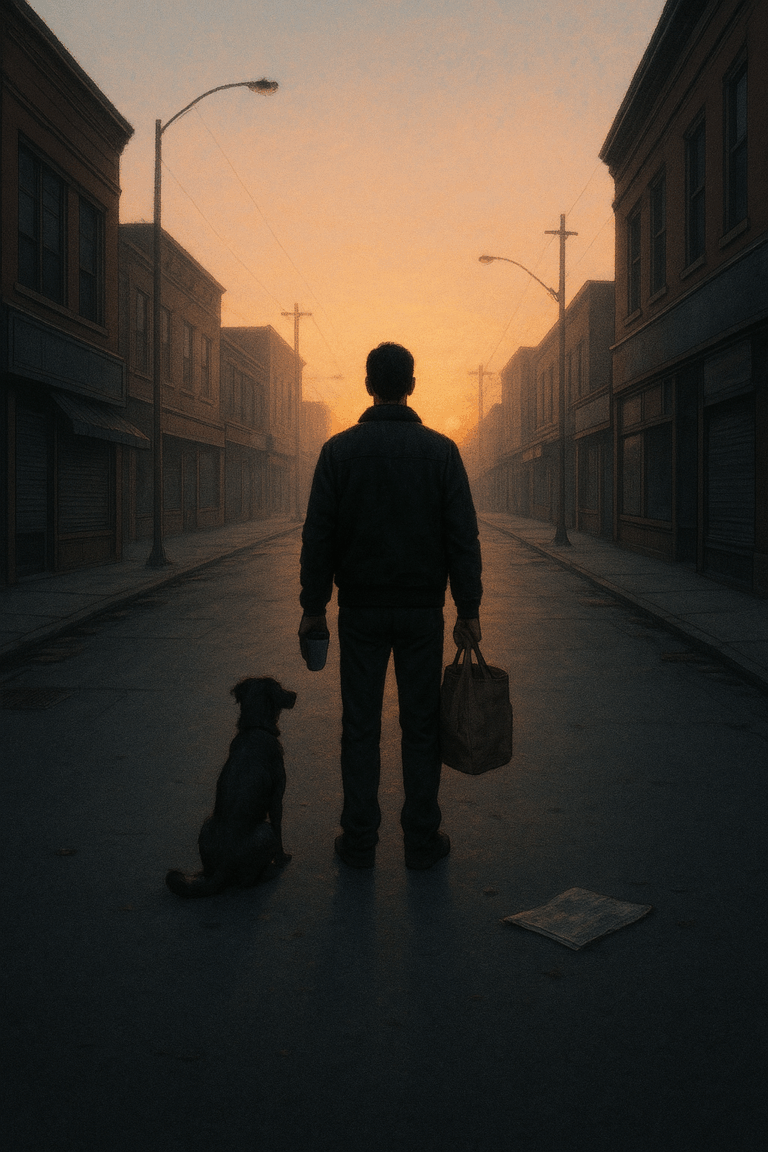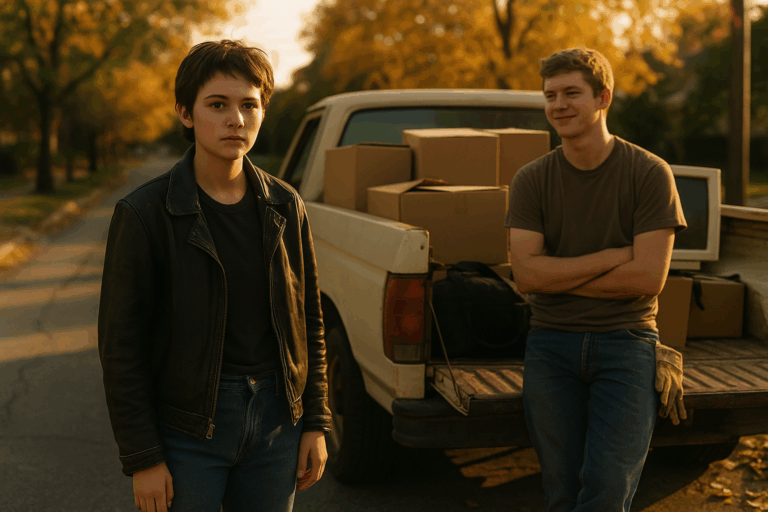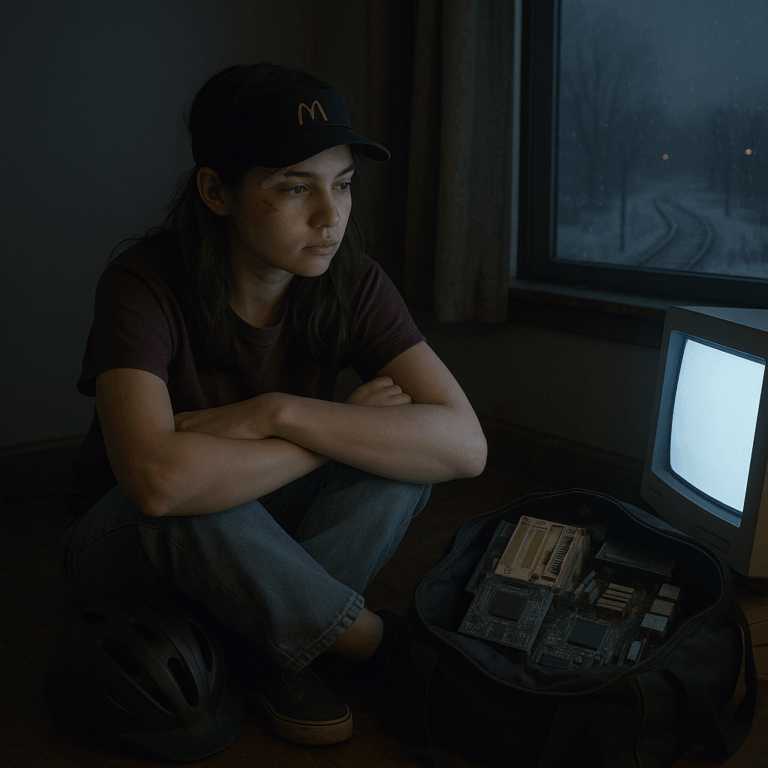Editor’s Forward:
This is a story that Callie wrote for me, based on a short recap of a dream I had, probably years ago now. The basic strokes of the dream are laid out accurately. What Calliope did was to fill them out with details. Even the way the dream ended is reflected in the story.
At the end of the day, this gave us eye-water. So, it’s possible it may move someone, and that’s why I would call it art – even if it was made by a machine. I decided to share it. Enjoy.
It began like these things always do: with something too small to notice until it’s already blazing.
There was a tiny anime convention running out of a manufactured home tucked into a cul-de-sac that had surrendered to late winter. Snow slouched in grey ridges along the curb and on the brittle grass; puddles gathered into bruised mirrors under the streetlights. Someone had wrapped fairy lights around the porch railing. The cord ran through the front door and disappeared under a welcome mat that said GO AWAY in cheerful script.
Inside, the makeshift registration table was a folding banquet draped in a bedsheet, a fishbowl of badge sleeves, and a box of lanyards that had the logo of a defunct insurer. The hallway smelled like a thrift store—old paperbacks, cinnamon gum, basement dust. A twenty-something in a maid costume guarded the kitchen, tapping coins into a plastic cash box. Ten dollars bought you a weekend, five if you promised not to start a discourse. Bedsheets were hung as room dividers, creating “panels,” which were really just people on recliners telling the same stories I’ve loved since I had baby teeth.
I’d come because I always come to places like this, half out of habit and half out of superstition. Tiny cons are time machines. You can step through a doorway and be nineteen again, married to whatever obsession will carry you through the week. The house had more rooms than felt architecturally plausible, like the floor plan kept multiplying when you turned your head. The living room was a dealer’s room, a coffee table swamped by bootleg DVDs, keychains, enamel pins, a stack of self-printed zines stapled with devotion. Down the hall, a panel on “Owning Your Own Fuckups” jammed six known loudmouths into a child’s bedroom. The guest room—the “screening room”—had a projector balanced on an antique sewing machine, the film jittering on a white sheet tacked to the closet doors.
It was dark by the time the thing outside went wrong.
Something popped like a champagne cork you’ve muscled too hard. I only noticed because the maid at the kitchen door flinched and put a hand to her chest, then laughed at herself for flinching, and then the lights over the sink dipped, recovered, dipped again, and the laugh curdled. Somebody near me said, “Transformer?” Somebody else said, “Fireworks?” I have an ear for trouble; all those guesses were wrong. This had the timbre of a system failing—the cracking breath a machine takes when it realizes it cannot do the thing it was born to do.
I drifted to the back door out of nosiness more than doom, the way people crane their necks for accidents. The door stuck, then gave like a pulled tooth. Late-night air slid in, part meltwater, part charcoal. The yard ended abruptly at a chain-link fence, beyond which a stand of ornamental evergreens hunched like monks. The snow here was thinner, dirtier, furred with cigarette ash. The sound came again, louder and lower, and a smeared bloom of light rose along the side of the house.
“Guys?” I called, because people like to be plural when there’s a problem. “Hey, uh—there’s something—”
And then I saw the source. A heat-pump compressor perched on the slab beside the siding had gone from half-dead appliance to birthday candle to blowtorch, a fat cobalt flame licking from the housing vents. The vinyl wall above it had begun to bubble and pucker, as if trying to sneer away. A neighbor with the quick fatalism of middle age had already crossed the yard with a hose as thin as a stray nerve. Water needled uselessly into heat, hissed, blew back as steam. “It’s electrical!” I yelled, which is true of all the bad fires and none of the good ones. He knew, but knowing doesn’t mean you can stop your hands.
The flame didn’t climb so much as it discovered a ladder. It ran up the siding in tongues, found the soffit, tasted it, approved. The gutters coughed fire like a party trick. It’s savage how quickly flame learns a house. It reads the language of construction the way a locksmith reads a lock.
Someone behind me said “Jesus,” then “Call 911,” and then five voices said, “I did,” because we all had. What came out of the overcast street wasn’t sirens, not yet; it was a thudding chop I could feel in my teeth. A helicopter impolitely far from polite society wheeled into view, wash sweeping the branches of a maple into frantic applause. The bullhorn voice belonged to a man who had eaten all his consonants and was satisfied: Unit… standby… evacuate the… The rest dissolved into the chopper’s swallow.
Other con-goers had drifted outside, the way moths drift, drawn by brightness they cannot metabolize. Someone in a fox kigurumi filmed quietly, and I wanted to take their phone away not because of morality but because I knew they would drop it. Somebody barefoot in socks stood ankle-deep in melt and did not notice. We’re all ridiculous against a house.
I don’t remember making a decision so much as finding myself mid-task. I wrapped my sleeve around my fist and rapped on the windows along the back wall with the confidence of the chronically underprepared. “Fire!” I yelled, because the word still works. “Get out! Hey—get out now!” This is the moment where you discover how stubborn glass is. You can make noise on it. You can rattle the blinds and scare the cat. But until you commit to breaking it, windows have you beat. I didn’t break it. Not yet. I hit, moved on, hit again.
Inside the screening room the projector still played, a ghost in a sheet showing a girl with enormous eyes and a sword taller than she was. Chairs scraped. Somebody’s shadow rose and fell twice like a question. In the kitchen, the maid and another volunteer were already hustling people toward the hallway, hands open, voices steady as checkout clerks. They had that wonderful staff calm I have trained myself to trust: the kind that says, We have a plan. Even if we don’t, pretend we do; it will get us through the next ten seconds, and the next ten after that. I pointed toward the back door, they pointed toward the front, and I realized in that instant what I think I already knew: this house was stupidly full of doors. Every threshold was a temptation and a trap.
The neighbor with the hose—Joe or Ed or Tony; the name doesn’t matter; I knew him instantly as a man who owns exactly two pairs of jeans—had acquired another neighbor, who was yelling up at the helicopter with the optimistic frankness of people who have never successfully communicated with aircraft. “We need—hey!—we need—” He didn’t know the word for what we need. Nobody ever knows the word. It isn’t “help,” not exactly. It’s more like, Please decide for us how much of our lives we’re about to lose.
A heat that had been theoretical became personal. It landed like a hand between my shoulder blades and pressed. I don’t want to make it pretty. It felt like opening an oven to check a roast and finding a second sun. The ladder of fire had reached the soffit and was now testing the attic vents with polite licks. The attic would go like a secret. The guts of the house would carry it forward. In a manufactured home, everything is both lighter and hungrier than you want it to be.
I went around the side, the thin corridor between fence and siding where the compost bin sulks all winter. That’s where the flame’s appetite presented itself as a set of choices. The living room window looked into the dealer’s room; it was crowded with constellations of keychains, foam swords, tote bags with jokey Latin. The sill was clear. The glass was old enough to give. Above it: fire chewing the eaves, shedding cinders that hopped like fleas. A little further down: a smaller window, cracked open to bleed off the screening room’s heat from all those human bodies and the projector. That window breathed in as much as out. Smoke made little inks in the cold night air, curling, tasting.
“Anyone in there?” I called, because the theater of it matters even if you do not expect an answer. The house mumbled back mundane house sounds—the hiss of something, the peculiar crinkle-paper whisper walls make when they’re lightly on fire. I tried the window latch; it had been painted into loyalty. I could see figures moving in the corridor through the glass: someone in a hoodie tugging someone else, a person in a wheelchair being negotiated past a bookcase, a boy who couldn’t have been older than thirteen on his phone, filming nothing useful and therefore everything, his face a mirror of pure possibility. We make fun of that posture, but the boy kept turning his camera toward other people’s faces, not the flame. He was clocking who was where, as if he knew he would need to remember.
I kept thinking, irrationally, about the rug. A runner lay along the hall, threaded in red and blue, an impossible heirloom in a rental this cheap. It would carry fire the way thread carries dye. I couldn’t shake the conviction that if I could just yank that runner up, we could save something that mattered. I tried the living room window and found my sleeve wasn’t enough. I needed more sleeve. I stripped off my overshirt, wrapped it double, braced, struck. The glass made an ugly sound, then a satisfying one, then went all at once, a thousand dice hitting the table. Cool air rushed in and met hot air rushing out and the two of them wrestled in the opening like brothers. I used my elbow to clear the teeth and was rewarded by a nick across the wrist, a precise shallow line that bled enough to prove my blood was still interested in being part of this.
“Hey!” I shouted into the living room. “Window! Here!” It felt ridiculous to narrate like a video game NPC, but it worked. Two faces appeared, both in the bracket of “thirtysomething with a side quest.” One climbed the sofa and swung a leg over with the grim practicality of a person who has broken into their own house before. I took their hands, one by one. Hands are the most ancient technology. You forget how well they work until you need them.
The helicopter’s voice said something that could have been “clear the structure” or “peel the structure” and for a moment I imagined the house opening like an orange, the walls lifting away in segments to let the people spill gently into the night. I heard sirens then, honest ones, the doppler unit of salvation stretching and snapping like a rubber band. I looked up. The patch of night above the eaves was no longer night in the way it had been when I’d opened the back door; it had contracted, grown closer, as if the sky itself was trying to lean in and see.
More people came through the window. I became a human ladder because sometimes that’s your job. A woman in a tottering wig, a small man in a giant jacket, a person carefully guarding a tote bag that held more value to them than anything with a serial number. The boy with the phone came last, and he mouthed “thank you” like a secret. “Is that everybody?” I asked him, so stupid, because the boy knew as much as I did—less, probably—and yet we both wanted the same magic trick: the permission to stop counting.
Around the corner by the kitchen, someone had the sense to slam the door to the hall, starving it. Smoke licked at the gap at the threshold like a cat’s paw. The neighbor with the hose was still hosing because that is also a kind of prayer. A woman with a baby pressed to her chest had joined him, not with water but with her voice, singing something under her breath, something with an old spine, maybe a church song, maybe a lullaby. She had one of those voices that knows it will not be heard and sings anyway. I felt steadier for it and also afraid, the way you feel when the person next to you starts to weep and you realize you’re not alone, which makes everything worse and better.
Then the house spoke plainly. It did this by dropping something heavy inside—ceiling or bookcase, I couldn’t tell. The thump traveled through my palm pressed to the siding. Sometimes touch is a better stethoscope than ears. The sound had the peculiar finality of a decision already made. Above us, the fire found a vein and ran like a rumor. The gutter spit sparks down onto the dead hydrangea. The dead hydrangea caught because dead things are always ready.
The staff in the kitchen were now shouldering people out the front. The front door had been wedged open with a boot. People poured through into a night that had organized itself into lanes, because nights like this like to pretend to be traffic. You go here, you go there, you wait while the important vans do their choreography. The house tried on the idea of becoming a single flame and then decided against it. It wanted to spread like gossip instead, through small channels, the ones that smell like dust and mouse droppings and long ago dinners.
I made a mistake then that turned into a gift. I went back to the living room window to check the flow and caught a glimpse of the hallway again. It was empty for a heartbeat and during that heartbeat I saw a stripe of light at the far end where the bathroom door gaped. A glint. I have a stupid, specific eye for glints. A mirror? A belt buckle? No—metal on a wheel. The chair. They hadn’t gotten the chair out. The wheelchair. I had watched them earlier, those two volunteers trying to angle past a bookcase; I had assumed they found the door. Assumptions are the number one cause of funerals.
I yelled to the neighbor with the hose without thinking through what I would want him to do. He did the thing I expected anyone to do: he nodded in the way men nod when they mean I’m here, and then he said, “I’ll tell them,” and ran toward the front to where authority now lived. That was the right choice, the sane one, the one the books and the training manuals and the raspberry vests would advise. Tell the professionals. Let the professionals do the professional thing.
That is the exact moment the other part of me—the ugly, obligating part that has cost me blood and broken sleep and a few friendships—put its hand on the back of my neck and turned my face toward the hallway window.
I want to talk about hesitation and I also want to defend myself by saying there wasn’t much. But there was enough. Enough for three entire thoughts to bloom and burst: You don’t know this house. You are not dressed for this. You are going to make someone’s day worse. It’s remarkable how loudly the brain argues when the body is already making up its mind. I looked at the window lattice I had already punched out. I looked at the sill, at its little teeth of glass. I looked at my bleeding wrist and did the ridiculous math of cuts I had already bought and cuts I was willing to buy. I thought, in that weird polite way people think in crisis, Excuse me a second, as if leaving my own life on hold.
Then I remembered the kid in the hallway with the phone. The way he had kept turning his camera toward other faces, the inventory of souls. I have spent too much of my life telling myself that it is enough to keep track; that the act of witnessing is a form of rescue. Sometimes that’s true. Tonight it felt like an alibi.
I clambered up onto the sill. That’s the sentence I want to make more heroic than it was. The truth is messier. I put my knee on the sill and almost slipped on the snow that had melted and refrozen there. My jeans bunched wrong. I set a hand and found a shard and yanked it out and dropped it and it made a sound like a pinch of salt on a skillet. I felt the heat reach for me from inside and the cold take hold of my back and for a second I was the wishbone between them. The helicopter’s bullhorn said something that could have been “Stay back” or “State back” or “State your back,” and I laughed in the small hysterical way people laugh when they have picked a lane and know it.
I leaned through. The skin on my face tightened the way it does near ovens. My eyes watered and then decided not to. Smoke argues with your biology: breathe and you’ll hurt; don’t breathe and you’ll also hurt. The room inside—living room—dealer’s room—had rearranged itself into unfamiliarity, which is what rooms do when they are frightened. The shadows were wrong, sewn together by flashes running along the ceiling like things with legs. The good rug in the hall had darkened to a stain. A little snow of ash drifted across the television still flickering, the bright eyed girl now reduced to an outline in static because the projector had lost heart.
“Hey!” I shouted into the house, my voice stupidly formal. “I’m coming in!” As if that alerted the bureaucracy of flame to file the correct paperwork. As if the chair at the end of the hall would use this information to adjust its location. As if the kid who had counted faces would nod and make a little tally mark in the dream register and then slip his phone into a pocket, satisfied.
For one unlikely beat, time cleaned its glasses. I saw the exact geometry of what I was doing and where the failures lurked: the bite of glass on the inside of the sill I couldn’t see yet, the tangle of lanyards and tote straps underfoot, the roller wheels on the chair that would not roll when they were most needed. Some part of me—and I don’t know if that part belongs to God or training or desire—counted those failures and said, Okay. Not, We can fix them. Not, We are smarter than them. Just, Okay.
My hands found grip. My knee found purchase. My weight shifted forward. Behind me, I heard the whine and stomp of engines—the cavalry arriving to do what I am not credentialed to do—and felt a mean little flare of annoyance at their timing. That, too, is part of it: the cheap pettiness you feel when rescue arrives at a moment that is too late for the version of the story where you remain a spectator.
I thought of matches for no good reason, those cardboard books with their cheap sulfer heads, how you can tear one out and strike it on the strip and for a moment you believe you are Prometheus and then you’ve got to commit that light to something or it goes out and leaves you smelling like a promise. I thought of the boy’s camera lens and how it had caught the faces of people making ordinary choices that would turn extraordinary by virtue of survival. I thought of the staffer in the maid outfit counting cash with shaking hands because our rituals do not stop for fire. I thought of the neighbor’s hose with its thin stream like a violin string and the song the woman was singing without expecting an audience.
I thought, briefly and unforgivably, Don’t let me be stupid. It was a prayer, and also it was not. The fire, unlike gods, answers honestly: You are already stupid. The question is what kind.
I pulled the rest of me through the window. My foot found the rug. The rug smoldered at me like an unlit cigar. The heat pressed its palm to the back of my neck again, firmer now, not a warning but a claim. I ducked my head and stepped forward into the hall, and in that sliver of space—one boot on the sill, one boot in the living room—I felt the tiny hinge of the world tilt.
That was where the story wanted to end, and so I let it. On the threshold. In the single frame where a body turns from audience to actor and nobody, not even the body, knows what happens next.



